- Home
- Lisa Kleypas
Love, Come to Me Page 10
Love, Come to Me Read online
Page 10
“Like what?” he prompted in a swift pounce.
“Like when I was little, and I would do something that made Father mad . . . before I could explain anything, he’d already made up his mind about why I had done it. There’s no way to fight that, and it’s not fair!”
Heath laughed, shaking his head ruefully. “No, it’s not. But with a daughter like you it’s no wonder your father had to resort to such tactics. Most of the time you have him wrapped around your finger, and he and everyone else knows it.”
“He’s a good man. He’s straightforward and he knows exactly what he wants—”
“Yes. You must favor your mother.”
She smiled reluctantly at the gentle taunt. “I don’t really know. I was too young to remember much about her. But I know that she was very beautiful.”
“I’m certain she was,” he said, giving one of the curls clustered at the back of her head a playful tug. The gesture was much too familiar, but she was too intent on her own thoughts to reprove him for it.
“Father never says a word about her. But Mrs. Morgan—one of the women who used to belong to some of the same groups and clubs—told me that my mother liked to make speeches at all the ladies’ charity clubs and social meetings. One time she burst into one of those town council sessions and made a fifteen-minute speech about letting girls go on through higher grades at the town school. They make them leave, you see, whenever there’s not enough room for all the boys. I think that Father had a hard time keeping her quiet.”
“That I can believe.”
“Were there women like that in Virginia when you were growing up?”
“Making speeches? Not exactly.”
“Is your mother—”
“No. She passed away when I was a boy.”
Surprised and fascinated by the revelation, Lucy suddenly wanted to know other things about him.
“What about your father? Does he—”
“He died during the war.” Heath’s indulgent mood seemed to drain away like water from a tub. Apparently he didn’t like to answer personal questions.
“Any family at all?”
“A half sister, a half brother . . . and a stepmother. Who fulfills all of the clichés about stepmothers that you’ve ever heard.”
“Do they ever—”
“Look at the sky . . . rain’s on the way. You’d better get back home before your hat gets ruined. Would you like me to take you in the barouche?”
“Oh, but people will see.”
“Yes, you must follow Daniel’s orders to the letter. I forgot.”
“I’m going to walk,” Lucy said stubbornly. “It isn’t far.”
He grinned and caught one of her hands in his, lifting it to brush a kiss across the tender skin below her knuckles. She went still, a strange, hushed feeling suffusing her at the merest touch of his mouth on her skin. “It’s been a pleasure, Cinda,” he murmured, and walked away with that distinctively lazy stride, as if he had all the time in the world to get wherever he was going.
Chapter 4
The first parish bell was ringing.
Lucy threw off the lace-trimmed sheet that was tangled around her legs and staggered out of bed to the window, staring at the scene outside before she was fully awake. The sky was filled with thick, low clouds that showered a gentle mist over the sleepy town. Despite the threat of rain, the clouds glowed a dull red, especially over the section of Concord around Lexington Road.
Her eyes widened as the street began to fill with people, vehicles, and horses. The wind drifted to her in a moist, warm surge, bringing with it the faint scent of smoke. She ran to the closet and hastily pulled out one of her oldest dresses, her movements awkward from haste and sleepiness. Everyone went to help when there was a fire; there were tasks that even the women and some of the older children could perform.
Snatching up the corset that lay across the embroidered seat of a chair, Lucy dressed as fast as she could. She pulled a powder-blue gown over her head and buttoned the bodice with clumsy haste. She tied her hair back with a ribbon and slipped on a pair of worn shoes that made little sound as she scurried downstairs.
Lucas Caldwell was already there, coiling a length of rope. He tucked the rope into a bucket that he had carried as a member of the bucket brigade, which had operated in the days before professional, paid fire departments and steam-pump engines. His white hair and snow-white mustache, usually so neatly groomed, were ruffled in comical disorder.
“Father, I’m ready,” Lucy said breathlessly, her flurry lessening in the face of his calmness. He was always so practical, so patient about everything, even in the face of disaster.
“The Hosmers have stopped their barouche outside. We’re going with them,” he replied, patting her on the shoulder briefly as they went to the front door.
“Father, please don’t take any chances tonight—you always take on the riskier tasks instead of letting the younger men do them! Remember, you’re all I’ve got, and if anything happens to you—”
“I’ll only do what’s needed, nothing more,” he assured her. “No heroics. But a Caldwell never avoids his duty, Lucy.”
“Yes, I know,” she said, and as she glanced at him she realized for the first time how quickly he was aging. A fine network of lines had dug into his cheeks and spread down to his neck, while pale brown age spots dotted his skin. She hated to think of how easy it would be for him to get hurt. “Please be careful,” she repeated softly, urgently. Lucas nodded absently, his attention caught and held by the sight of the thickening clouds in the distance. There would not be enough rain to quench the blaze or hinder its progress.
There was little talk between them and the Hosmers as the carriage raced in the direction that all the others were going. The Hosmers’ three sons perched eagerly in their seats; all of them were in their teens and filled with excitement untempered by the worries that the adults had to face. Lucy gripped the edge of a cushion in tension, her long chestnut hair threatening to escape its fastenings as the wind whipped over her. She let out a brief, surprised sound as they approached the blaze.
It was the Emersons’ home. The roof and the upper floor were already consumed by fire, which seemed to rise higher with each second, until it seemed to brush against the clouds. Hordes of people bustled around the ground, some daring to make brief forays into the bottom floor to rescue furniture and clothing. The members of the fire department were hard at work to control the flames, but it looked like it was too late for them to do much good. In front of the house, the huge white horses that had pulled the steam-pump engine stomped impatiently. The black boiler of the engine emitted large gusts of smoke as it labored to pump water through the thick suction hose, while water dripped down the shiny brasswork and gold-striped wheels. Slowly the barouche was brought to a halt in front of the yard, which was littered with personal articles and papers that had been brought out of the house.
“That poor man,” murmured Mrs. Hosmer, a graying redhead with keen blue eyes undimmed by fifty years of hard living. She was a brisk but kindly woman. Lucy followed her gaze to see Mr. Emerson standing before the burning house, his pale hair lank against his cheeks, his bent shoulders covered with a sodden coat. “He’s set in his ways, he is, likes everything in its proper place. This is harder on him than it would be on most.”
“He’s got many friends,” Lucas Caldwell observed mildly, helping Lucy out of the carriage. “The Emersons will get through this just fine.”
“I hope so,” Lucy said, and gave her father a quick kiss before dashing off to the line of women and children next to one of the downstairs windows. They were passing armloads of clothes and pieces of china from the house to the end of the line, out of harm’s way. The men were busy taking the best pieces of furniture outside, grunting with effort and sweating from the incredible heat of the fire. From several feet away Lucy could feel it scorching her cheeks. It was like standing in front of a hot oven in the middle of August.
“Has someone
seen Mrs. Emerson’s document box?” Daniel’s sister Abigail asked loudly, coming over from the spot where the Emerson family was gathered. “It was in the library. She said she put some important papers there, some bonds and contracts.” They all searched the yard quickly, but no box could be found. There was a moment of silence and indecision, and Lucy looked from face to face, realizing that they were all afraid to go in the house.
“I’ll do it,” she said, tightening the ribbon around her hair to make sure that it stayed tied back.
“But it’s dangerous—”
“Not yet. The men and boys are still inside, getting the furniture. The fire hasn’t made it downstairs.” Lucy dashed to the half-open window before anyone could offer any further objections, hoisting herself up and clambering over the sill. She closed the window most of the way before venturing further into the room, which looked like the parlor. It was so hot and smoke-hazed in there that she could barely see. An unearthly stillness settled in the room while the sound of fire roared all around.
The doorknob was still pretty cool. Cautiously she opened the door and went into the hallway, where men rushed back and forth in the last efforts to rescue valuables. In the frantic, traffic-ridden hallway no one seemed to take notice of her, and she sidled along the wall to the next doorway. It was the library, she saw with relief, and slipped inside. The smoke stung her eyes and seemed to sear the inside of her nose. Coughing, Lucy felt her way around a huge, solid table and bumped into a chair, knocking something to the ground. A pang of triumph quivered in her chest as she squinted down at the square metal object. The document box.
Grabbing the box, which was already warm to the touch, she stowed it under one arm and ventured gamely out into the hallway, where the shouted warnings and crashing sounds were deafening. She was coughing so hard that she could barely breathe. As a boy carrying a heavy chair rushed by, he bumped her accidentally, causing her to stumble against the wall. Suddenly a burning timber fell down from the ceiling, narrowly missing her, and she stared at the splintering, blazing hunk of wood in shock. The ceiling was beginning to crumble in! Lucy’s hasty courage fled as her face paled with the beginnings of real fear. Her pulse raced as quick as lightning. Irrational though it was, her first instinct was to head for a corner to hide in. She had to get out of here! Afraid that her skirts would catch on fire, she started to edge around the timber carefully. Just then a booted foot kicked aside the timber in one swipe and her shoulders were seized in a grip so brutal that she dropped the document box.
“What the hell are you doing in here?” a hoarse masculine voice demanded, and she looked up into Heath Rayne’s hard eyes. She was so startled by the vicious bite of his hands and his savage appearance that she couldn’t have said one word to save her life. His coppery skin was gleaming with sweat and smudged with soot, his eyes narrowed and reddened from smoke. The shirt he wore was rolled up at the sleeves, revealing heavy muscles that strained tightly against the damp linen; the shirt parted down his chest to a midriff that was taut and patterned like a washboard. He looked so angry that he seemed about ready to cuff her, and for just a second she was afraid that he would. “I want you to get your little rear end out of here!” he snapped. “Why hasn’t your father or your damned fiancé kept an eye on you? If neither of them is going to bust your backside for this, I sure as hell am!”
“I came in here for an important reason!” Lucy interrupted indignantly, wriggling free of his painful grip and bending to scoop up the box. She paused as a spasm of coughing shook her.
Heath muttered a curse and took the heavy object from her as soon as she straightened up. He hooked an arm around her waist and rapidly half-dragged, halfcarried her through the hallway. The front door was edged on either side with long tongues of flames. Lucy stopped struggling as he sheltered her with his body and carried her through. Her nose and cheek brushed against his wheat-gold hair, which was darkened with sweat. She could feel the cruel, limitless power of his arms around her, as secure and unyielding as the jaws of a lion. His lack of fear made her feel like the kind of woman she most despised, the kind that acted clinging and helpless in the presence of a strong man. Breathing deeply, she hung onto her wits and lifted her head from his shoulder. She started to pull away from him as soon as they got through the door. He let her feet drop to the front porch, steadied her, and handed her the metal box. It felt much heavier than before, and she took it with trembling arms.
“First you almost drown, then you’re almost burned to a cinder,” Heath said, turning her around and giving her a firm push in the direction of the steps leading to the street. He still sounded angry, but not quite as much as before. “God knows what you’ll get into next.”
“I would have been fine without you!”
“Like hell. Now stay away from here.”
She didn’t dare talk back to him as she watched his broad-shouldered frame disappear through the doorway again. Going down the steps, Lucy was surprised to find that her knees were weak as she made her way to the pile of furniture in the yard. After setting the document box down carefully on a sofa, she watched as the men carried the last pieces of furniture out of the house. None of them could go back in now. The fire had destroyed the top floor and was spreading to the downstairs; it had eaten at the ceilings and crumbling walls until the house was a death trap.
She made her way over to her father, who was standing near the Emersons and watching the magnificent blaze. Mr. Emerson was clearly suffering from shock, his eyes traveling slowly over the crackling flames and seeming to take none of it in. Filled with pity, Lucy averted her eyes, unable to look on the face of such open grief. Several yards away she saw Daniel’s wiry figure as he and some others took inventory of what had been saved. Guiltily she realized that she hadn’t even given a thought to Daniel or worried about whether he was all right or not. Clenching her hands together, she made up her mind to go over to him as soon as the scene calmed down a little.
“My manuscript,” Emerson suddenly said, his voice so soft at first that it was difficult to hear. “My last manuscript. There is no copy of it aside from the one in the house. My manuscript!”
“Don’t worry, Mr. Emerson,” someone said soothingly. “I’m sure someone’s got it—”
“Who? Where is it?” Emerson latched onto the idea with new energy, his voice rising in agitation. “It was kept in a white box in the library. Where is it?”
There was a brief scuffle around the yard as they all tried to find the manuscript, but it didn’t turn up. “My manuscript,” Emerson said, his voice shaking. His face was papery white as he stumbled away from the people who tried to surround him and offer their comfort. He nearly tripped over Heath, who was seated on the ground with his forearms propped on his knees in a weary posture. Heath, his blue eyes narrowing, lifted his head and looked up at the other man. There was a world of difference between them, one man elderly and frail, filled with the knowledge of a lifetime of experience, the other strong and so very young, with a whole life stretching out before him. One from the North, one from the South. But there were similarities between them. If nothing else, they both shared an uncommon respect for the written word, and Heath understood exactly what the loss of the manuscript meant to the old man. As they stared at each other silently, Heath got to his feet, and then he muttered an explicit oath, taking off for the house.
Paralyzed, Lucy watched as he snatched up a soaked quilt from the ground and loped up the front steps. No one made a move to stop him. “No,” she said, too quietly for him to hear, and as he got nearer to the inferno, she cried out in panic. “Don’t!”
If Heath heard her, he ignored her, and he disappeared into the blazing house. As she tried to take a step forward, her father held her back, whispering that everyone was looking at them. Her breath came harshly through her throat; her heart pounded until it hurt. Her eyes were fastened on the doorway as she stood like a statue, her muscles as rigid as iron. From somewhere in the house there came a thundering
crash, the sound of another section of the roof falling in. Her father put a hand on her arm and she flinched away, staring at the doorway as if that alone would make Heath appear. It seemed that hours passed by, and still there was no sign of him.
“Lucy, what’s the matter?” She heard Daniel’s voice, and she turned to him. He looked tired as he sighed and stretched his shoulder muscles.
“The . . . I . . . Mr. Rayne is in there,” she said tightly. “Don’t you even care?”
“Care?” Daniel repeated, catching her by the elbows and staring down into her face. Confusion and then irritation shone in his dark brown eyes. “I suppose we all do . . . but no one quite as much as you. Why is that, Lucy?”
“He’s a human being! Why doesn’t anyone seem to care about what’s happening? Why doesn’t anyone understand ?”
Daniel’s voice was sharp and steady as he answered her. “You were just a child during the war—you are the one who doesn’t understand. His kind would just as soon shoot us as let us live. My God, do you know what the Rebs did to us during the war? Some of them were no better than Indians, scalping Union soldiers, skinning them! Do you know what they did to us in those stinking prisons? They treated us like animals, letting us die for want of food and medicine—oh no, I won’t forget, and I won’t forgive. And as for this particular Confederate—he may be handsome and as charming as the devil, but underneath he’s as dirty and rotten as the rest of his kind. He isn’t worth caring about.”
“But they weren’t the only ones. I heard about what Union soldiers did to the Southerners,” Lucy said, wiping at the tears that fell down her cheeks. “About burning their homes and land, about what they did to the women . . .”
Daniel went very still. “What are you saying?” he demanded, his face harsh and his eyes piercing.
“I don’t think either side was all good or bad—”
“You’re upset by all the excitement,” he interrupted coldly, “which is why I’m going to forget this conversation. Don’t try to think about things that are beyond your understanding, Lucy. If you had been in the war you would know what kind of people Southerners are, and you would know enough to hate them. And if I were you, I’d stop worrying about your stinking Rebel, because the only thing that’s going to get him out of that house now is a miracle.”

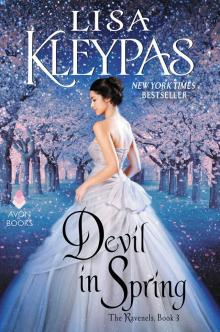 Devil in Spring
Devil in Spring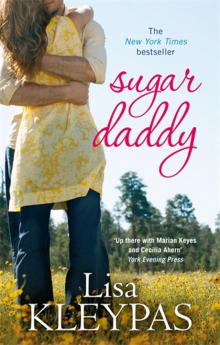 Sugar Daddy
Sugar Daddy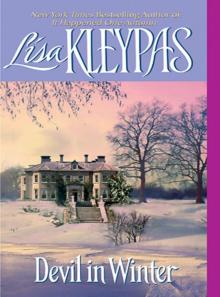 Devil in Winter
Devil in Winter Dreaming of You
Dreaming of You Christmas Eve at Friday Harbor
Christmas Eve at Friday Harbor Love, Come to Me
Love, Come to Me Only With Your Love
Only With Your Love Suddenly You
Suddenly You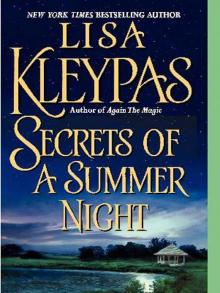 Secrets of a Summer Night
Secrets of a Summer Night Cold-Hearted Rake
Cold-Hearted Rake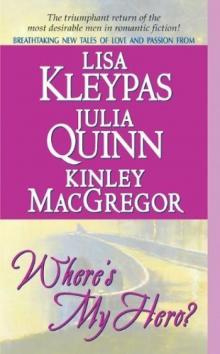 Where's My Hero?
Where's My Hero? Gifts of Love
Gifts of Love Married by Morning
Married by Morning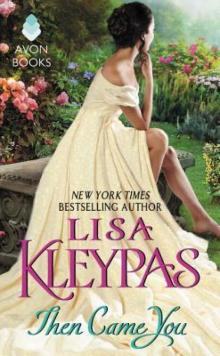 Then Came You
Then Came You Wish List
Wish List Where Dreams Begin
Where Dreams Begin A Historical Christmas Present
A Historical Christmas Present Somewhere I'll Find You
Somewhere I'll Find You Scandal in Spring
Scandal in Spring Someone to Watch Over Me
Someone to Watch Over Me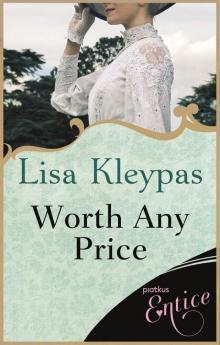 Worth Any Price
Worth Any Price Prince of Dreams
Prince of Dreams It Happened One Autumn
It Happened One Autumn Love in the Afternoon
Love in the Afternoon Devil's Daughter
Devil's Daughter A Wallflower Christmas
A Wallflower Christmas Tempt Me at Twilight
Tempt Me at Twilight Brown-Eyed Girl
Brown-Eyed Girl Mine Till Midnight
Mine Till Midnight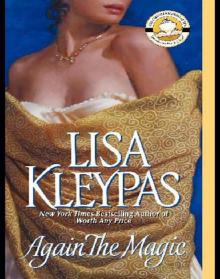 Again the Magic
Again the Magic Lady Sophia's Lover
Lady Sophia's Lover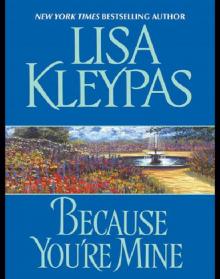 Because You're Mine
Because You're Mine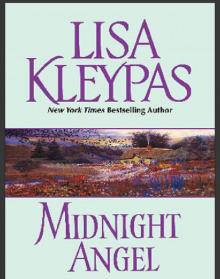 Midnight Angel
Midnight Angel Smooth-Talking Stranger
Smooth-Talking Stranger Blue-Eyed Devil
Blue-Eyed Devil Hello Stranger
Hello Stranger Dream Lake
Dream Lake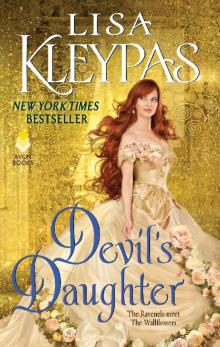 Devil's Daughter: The Ravenels Meet the Wallflowers
Devil's Daughter: The Ravenels Meet the Wallflowers A Christmas to Remember
A Christmas to Remember Smooth Talking Stranger
Smooth Talking Stranger Crystal Cove
Crystal Cove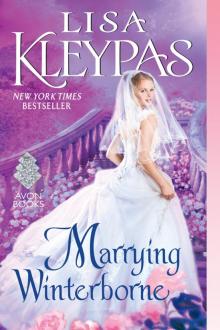 Marrying Winterborne
Marrying Winterborne Stranger in My Arms
Stranger in My Arms Devil in Disguise
Devil in Disguise Worth Any Price bsr-3
Worth Any Price bsr-3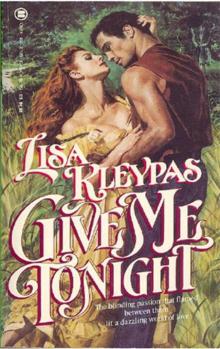 Give Me Tonight
Give Me Tonight Rainshadow Road fh-2
Rainshadow Road fh-2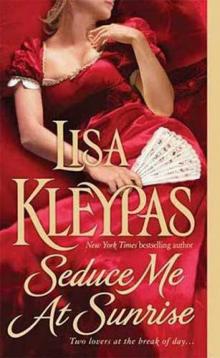 Seduce Me At Sunrise
Seduce Me At Sunrise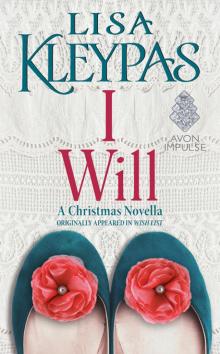 I Will
I Will Someone to Watch Over Me bsr-1
Someone to Watch Over Me bsr-1 Lady Sophias Lover bsr-2
Lady Sophias Lover bsr-2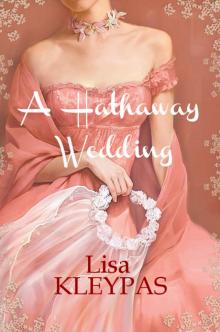 A Hathaway Wedding
A Hathaway Wedding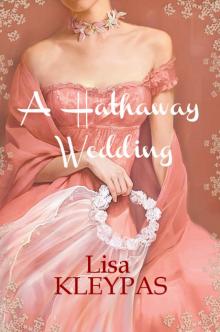 A Hathaway Wedding (Hathaways Bk2.5)
A Hathaway Wedding (Hathaways Bk2.5) Worth Any Price - Bow Street 3
Worth Any Price - Bow Street 3 Christmas with Holly
Christmas with Holly